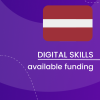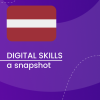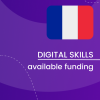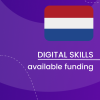Training of 1,000 new ICT specialists in Latvia

With the support of a €4.2 million investment from the EU Recovery and Resilience Facility (RRF), Latvia plans to train 1,000 new information and communication technology (ICT) specialists by June 30, 2026. At least 30% of these specialists will be women, promoting gender balance and inclusive development. This initiative is outlined in the amendments to regulations prepared by the Ministry of Education and Science, which were approved by the government on May 20, 2025.
The EU Recovery and Resilience Facility investment will enable a new, flexible learning approach: self-directed learning in the ICT field. This approach allows people to acquire high-level digital skills needed in the job market outside of the formal education system. It's an opportunity to train ICT specialists faster, more practically, and in a more targeted way, in close collaboration with the industry.
The STARS Platform: A National Hub for Adult Education
The training will be implemented as part of the individual learning account system STARS, which is currently being tested under another RRF investment called "Development of the Individual Learning Account Approach." This system will provide a national platform for adult education. This solution will reduce administrative burden and strengthen a unified approach to adult education support, as self-directed ICT specialist training will be one of the adult education programs offered on the stars.gov.lv platform.
This approach is particularly important for small and medium-sized enterprises (SMEs), which make up over 94% of all registered companies in Latvia. They need employees who can practically implement specific digital solutions, often with real, practical knowledge, abilities, and skills rather than formal qualifications.
Key Benefits for Learners
This learning approach offers several advantages for students:
- Individual pace and flexibility: Each person can learn at their own pace, adapting the process to their capabilities, life situation, and available time.
- Personalized learning: Students can choose the specific topics that are relevant to their professional growth or business needs.
- Real-world industry connection: The curriculum is developed in collaboration with employers to solve specific industry tasks.
- Skill recognition: The skills acquired can be recognized in the context of professional qualifications or further education.
A similar self-directed learning model has already been successfully implemented in several other European countries, including Finland, Estonia, the Netherlands, and France.
The government-approved amendments to the regulations, "Amendments to Cabinet Regulation No. 506 of July 23, 2024, 'Regulations on the Implementation of Latvia's Recovery and Resilience Mechanism 2.3 Reform and Investment Direction 'Digital Transformation' 2.3.1.r. Reform 'Sustainable and Socially Responsible Support System for Adult Education' 2.3.1.4.i. Investment 'Development of the Individual Learning Account Approach'," are available on the Cabinet of Ministers website.






